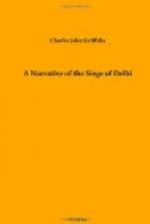As far as I know, the Government, when distributing the prize-money in two installments—in 1862 and again in 1865—gave no account of the total amount which had been collected. The private soldier’s share was reckoned as the unit, value about L17, increasing according to the pay of the different ranks—the Ensign five shares, Lieutenant six and a half, Captain eleven and a half, and so in proportion among the higher grade of officers, while that of the Commander-in-Chief amounted to one-sixteenth of the whole—an immense sum. There were, of course, many exaggerations as to how much each rank would receive as its share, and there were many heart-burnings also when the true amount became known. The sum had dwindled down to less than one-third of what we expected, and not a few expressed openly their conviction that some tampering had taken place with regard to the distribution. This can hardly be believed, though it has always been a notorious fact that the Government are inclined to treat the claims of those who fight their battles with neglect, and in one particular at least, by repudiating the 5 per cent, promised till the Delhi prize-money was paid, they acted up to their usual unjust policy, and gave occasions for the complaints which were raised at the time.
I will now proceed to give an account of my experience when acting as an assistant to an officer who was accredited by the prize agents with a permit to search for plunder. This officer, an old friend of mine, asked me to accompany him on his expeditions, saying also that he had no objection to my helping myself in moderation to part of the loot which we might happen to find. Carrying with us the necessary tools, such as hammers, spades, and pickaxes, we each day started—accompanied by two coolies—on our plundering excursions. For some days we were very unsuccessful, and for nearly a week only managed




